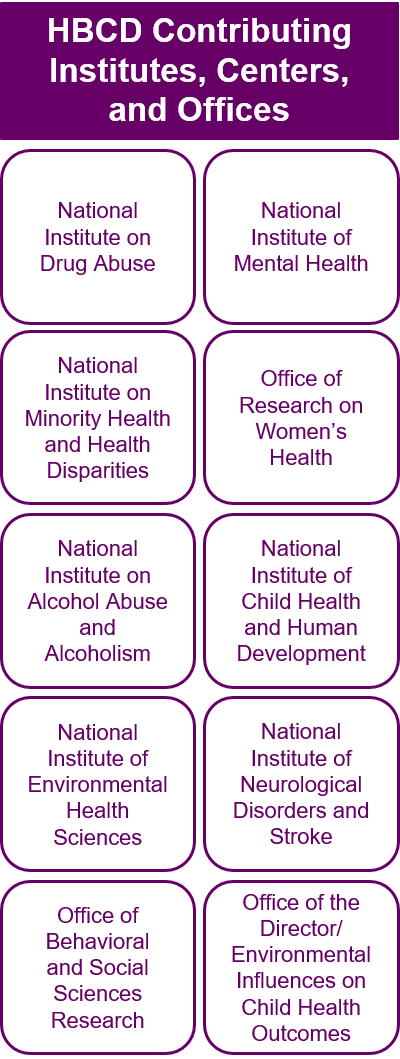HEALthy Brain and Child Development (HBCD) Study
What is the HBCD Study?
The HBCD Study is an exciting NIH initiative to help researchers and clinicians address a critical gap in our knowledge of how environmental exposures, especially opioid and other drug use, affect infant and child brain development. HBCD aims to contribute to our understanding of normal cognitive, behavioral, social, and emotional function from the prenatal period through childhood. It is a part of the NIH’s larger Helping to End Addiction Long-term (HEAL) Initiative, a multi-agency effort to curb the national opioid crisis.
How Will the HBCD Study Be Implemented?
The HBCD Study will:
- Recruit a large, diverse cohort of pregnant women from regions of the country affected by the opioid crisis and longitudinally follow them and their children for at least ten years.
- Collect data on pregnancy and fetal development, infant and early childhood structural and functional brain imaging, neurophysiology, anthropometrics, medical and family history, biospecimens, and social, behavioral, emotional, and cognitive development.
- Establish community advisory boards to inform the study design, particularly with respect to ethical, legal, or social issues in vulnerable populations.
What will be learned from the HBCD Study?
Some of the goals of the HBCD Study include:
- Predicting and preventing future substance abuse, mental disorders, and behavioral and developmental problems associated with prenatal and postnatal exposure to opioids, other drugs, and environmental exposures.
- Optimizing assessment and imaging protocols for prenatal stages through childhood.
- Studying how other environmental factors, including socioeconomic status, neighborhood status, and family stability, affect early development.
- Examining whether there are key developmental windows during which:
- The impact of adverse environmental exposures influences later neurodevelopmental outcomes.
- Benefiting influences (e.g., substance use disorder treatment; social/economic support) are protective against the potential neurodevelopmental insults of early adverse exposures.

Who is leading the HBCD Study?
The HBCD Study receives half of its financial support from the NIH HEAL Initiative and half from NIH Institutes, Centers, and Offices interested in development:
- National Institute on Drug Abuse
- National Institute of Mental Health
- National Institute on Minority Health and Health Disparities
- Office of Research on Women’s Health
- National Institute on Alcohol Abuse and Alcoholism
- Eunice Kennedy Shriver National Institute of Child Health and Human Development
- National Institute of Environmental Health Sciences
- National Institute of Neurological Disorders and Stroke
- Office of Behavioral and Social Sciences Research
- Office of the Director
- Environmental Influences on Child Health Outcomes
Page updated June 1, 2021

















